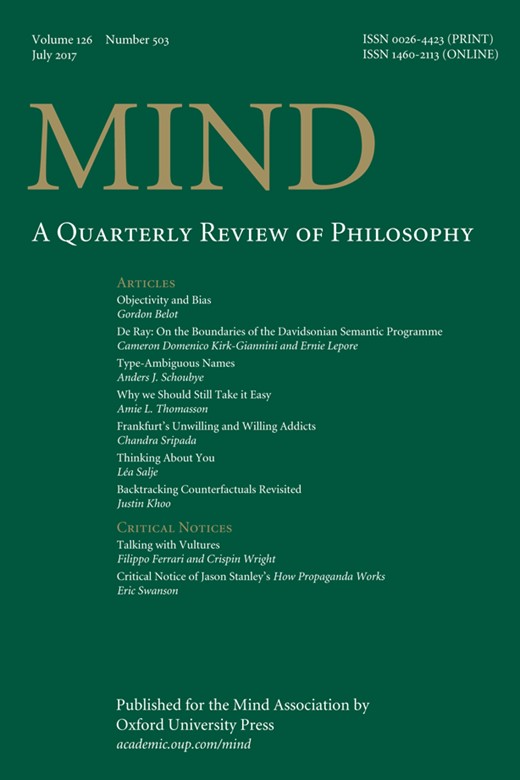-
Views
-
Cite
Cite
Johan E. Gustafsson, Moral Aggregation, by Iwao Hirose, Mind, Volume 126, Issue 503, July 2017, Pages 964–967, https://doi.org/10.1093/mind/fzw064
Close - Share Icon Share
Extract
In a choice between saving five people or saving another person, is it better to save the five, other things being equal? According to utilitarianism, it would be better to save the five if the combined gain in well-being for them would be greater than the loss for the one. A standard objection is that adding up the gains or losses of different people in this manner is a problematic form of interpersonal aggregation. It is far from clear, however, what more precisely is supposed to be problematic about utilitarian aggregation. The aggregation critics—that is, among others, John Rawls, Robert Nozick, Thomas Nagel, John M. Taurek, and T. M. Scanlon—have not offered a clear criterion for what counts as a morally problematic form of aggregation and what does not. Hence it is hard to know what to make of this objection.
In Moral Aggregation, Iwao Hirose makes an admirable attempt to provide a precise account of the kind of aggregation that these critics have found problematic in utilitarianism and similar theories. Hirose's interpretation is mainly based on the following remark by Taurek:
Let interpersonal aggregation be the kind of aggregation that aggregation critics such as Taurek have found morally problematic. According to Hirose, interpersonal aggregation is ‘the combination of different people’s morally relevant factors (i.e. good, well-being, happiness, pleasure, desire-satisfaction, claims, reasons, and so on) into a real value that represents the relation of sets of morally relevant factors’ (p. 24). More precisely, Hirose proposes that interpersonal aggregation is equivalent to the conjunction of the following four conditions:It is not my way to think of them [the five] as each having a certain objective value, determined however it is we determine the objective value of things, and then to make some estimate of the combined value of the five as against the one. (Taurek, 1977, p. 307 as quoted by Hirose, p. 22)
Based on this interpretation of the aggregation critics, Hirose goes on to discuss whether interpersonal aggregation defined in this manner should be rejected in ethics. His answer in the end is a qualified no. The qualification is that he only defends what he calls formal aggregation, where the morally relevant factors for individuals are undetermined outside of the aggregation process. Hirose contrasts formal aggregation with substantive aggregation, where the morally relevant factors for individuals are determined outside of the aggregation process, as in hedonistic utilitarianism, where the well-being of an individual depends only on the individual’s hedonic states. In the following, I shall assume that individual well-being is determined in this substantive manner.Interpersonal comparability: For every pair of persons, it is possible to compare the morally relevant factor of one person with the morally relevant factor of the other. (p. 32)
Impartiality: Other things being constant, two alternatives are morally indifferent if they differ only with regard to the identities of people. (p. 36)
Pareto: If one alternative is F-er for some person than another alternative, and if it is at least as F for the other persons, then it is F-er than the other. (p. 38)
Continuity: For any set of morally relevant factors ai, define
is at least as F as
and
is at least as F as
. Then
and
are closed (in other words,
and
contain their own boundaries, for any ai in the set of morally relevant factors). (p. 40)



